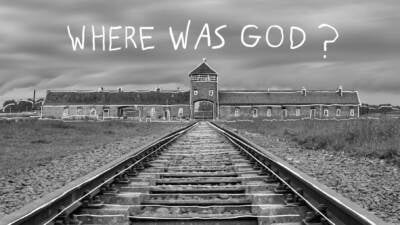Share
In April 2020, to coincide with Yom HaShoah, the day in the Jewish calendar dedicated to Holocaust remembrance, and the 75th anniversary of the liberation, Rabbi Sacks launched a series of videos offering his perspective on many of the big questions raised when studying the Holocaust.
After the Holocaust, I feel I must believe in God because I simply cannot believe in humanity. The Holocaust did not take place in some medieval century. The Holocaust did not take place in some benighted third world country. It took place in the very heart of Europe. It took place in the Germany of Goethe, and Schiller, and Kant, and Hegel, and Bach, and Beethoven. It took place in the country that held itself to be the most civilised in the world. In the century that was held to be the most exalted of the world.
It took place in enlightened, emancipated Europe. And don’t believe for one second that it was only Germany. If you had asked in 1900 which are the global epicentres of antisemitism, there could be only two answers. Paris, the Paris of the Dreyfus affair, and Vienna, the Vienna of the notoriously antisemitic mayor, Karl Luege.
Now Paris and Vienna were the most sophisticated cosmopolitan cities in the world, and yet they were world leaders in antisemitism. And the Holocaust was not driven, ground up by the masses. The fact is that more than 50% of doctors in Germany were members of the Nazi party. The greatest philosopher in Germany, Martin Heidegger, was an enthusiastic member of the Nazi party. The greatest legal mind in Germany, Carl Schmitt, was the legal theorist of the Nazi regime.
Jews were dismissed overnight, every single one of them from all the professions, from the courts, from the law, from medicine, from academic life, and nobody protested. And the truth is that had they protested, those protests would have been effective, because we know that actually certain doctors and certain Christian leaders protested the euthanasia programme and it was stopped. But nobody protested when Jews were simply, overnight, removed from the professions and declared to be, in effect, subhuman.
Now, these were the leading minds in Germany. The Wannsee Conference in January 1942, which resolved on Der Endlösung, the Final Solution… More than half of the people sitting around the table were doctors. They were either medical doctors, or people with doctorates and they were the ones who decided on the Vernichtung, the extermination of all 11 million of Europe’s Jews. That was the plan, that Europe as a whole should be Judenrein, free of Jews.
Now, I don’t know anyone who can have faith in humanity after that. It is shattering and shocking, and therefore I feel we have to have faith in the one Being who has lifted humanity towards the angels, and away from the demons. And that is God. For me, belief in God after the Holocaust is difficult, but necessary.

This series, created in partnership with the Holocaust Educational Trust, has been made possible thanks to the generous support of Richard Harris.
View the full Holocaust series of curriculum resources with additional discussion questions and historical background
More Holocaust Curriculum Resources

Faith After the Holocaust
Rabbi Sacks responds to the devastation of the Holocaust

Where can you find hope in the history of the Holocaust?
Hope and the Holocaust (Topic 10)

How does the Holocaust impact interfaith relations today?
Interfaith Relations and the Holocaust (Topic 9)

How do you connect the Holocaust with the establishment of the State of Israel?
Israel and the Holocaust (Topic 8)

Do you think it’s ever possible to forgive the perpetrators of the Holocaust?
Forgiveness and the Holocaust (Topic 6)

What is the difference between vengeance and justice?
Jewish Theology and the Holocaust (Topic 5, part 3)

What about a statute of limitations?
Just Punishment and the Holocaust (Topic 5, part 2)

A Just Punishment for the Nazis?
Just Punishment and the Holocaust (Topic 5, part 1)

Do you think the Holocaust represented a failure of humanity?
Humanity and the Holocaust (Topic 2, part 1)

Does God care about individual lives, or merely the survival of the Jewish people as a nation?
God and the Holocaust (Topic 1, part 3)

Where was God during the Holocaust?
God and the Holocaust (Topic 1, part 1)

What is theologically unique about the Holocaust?
Jewish Identity and the Holocaust (Topic 7, part 3)

Practically speaking, is there something unique about the Holocaust?
Jewish Identity and the Holocaust (Topic 7, part 2)

Should a Jewish theological response to the Holocaust include issues of justice?
Jewish Theology and the Holocaust (Topic 3, part 2)

Should the Holocaust be a key ingredient of our Jewish identity?
Jewish Identity and the Holocaust (Topic 7, part 1)

How has the Holocaust impacted your personal relationship with God?
Personal Faith and the Holocaust (Topic 4)

What do you think the Jewish theological response to the Holocaust should be?
Jewish Theology and the Holocaust (Topic 3, part 1)

How can I have faith that God is within each of us if I mistrust humanity?
Humanity and the Holocaust (Topic 2, part 3)

Can we trust people other than ourselves?
Humanity and the Holocaust (Topic 2, part 2)
